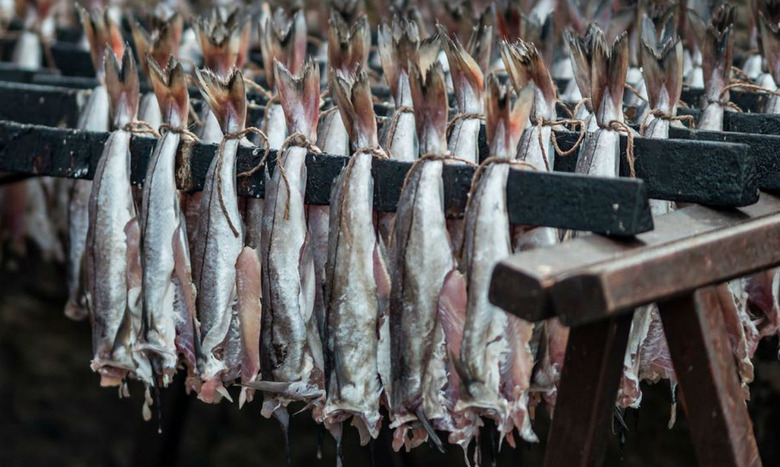Scotland's Other Great Smoked Fish: Arbroath Smokies
It isn't hard to find Iain Spink at the Dundee Flower & Food Festival, a sprawling outdoor fair full of food stalls, cooking contests, exhibition gardens, product displays, and more held every September at Dundee's Camperdown Country Park. A plume of woodsmoke rises from his corner of the fairgrounds, and its aroma winds through the air seductively, leading me to his stand.
He's there, doing what he does: smoking pairs of haddock, strung together by their tails and hung from racks, over smoldering oak and beech logs in shallow wooden tubs that look like truncated wine casks. Damp burlap bags thrown over the racks hold in some of the smoke. When the fish are done — the process takes roughly 40 minutes — they're lightly bronzed, with flaky flesh and a surprisingly mild flavor, unmistakably smoky but sweet and clean.
These are Scotland's famous Arbroath Smokies, a product more uniquely Scottish and arguably more interesting to the gastronome than even the country's famous smoked salmon. The official definition of the Arbroath Smokie for its European Union PGI (Protected Geographical Indication) certification states that it must be "a hot-smoked, headless and gutted whole haddock processed in Arbroath.... In size, [Smokies] weigh between 350-550g [about three-quarters of a pound to a pound and a quarter] and are sold in pairs as processed tied with jute string. In colour they are deep golden to mid brown externally, creamy white internally. In texture they are dry on the outside, moist and juicy on the inside with flesh which flakes and removes easily from the bone. They have a very pleasant, mild, fishy flavour with a light smoky taste and slight salt enhancement.... The Arbroath Smokie has been described as being to the humble haddock what prosciutto crudo is to the hind leg of a pig."
The process, said to be of Scandinavian origin (though some say the Picts developed it), involves gutting the haddock at sea — "The Vikings would have smoked any kind of fish they could find," Spink told me when I visited him at the Dundee fair, "but eventually the Scots settled on haddock because it was available year-round" — and then dry-salting them in tubs before tying them together for smoking. In the old days, they were smoked over tubs, the way Spink does them; today, according to Spink, the big commercial smokers "do basically the same thing, but in six-foot brick pits."
Strangely enough, the Smokie doesn't originate in Arbroath, which is about 15 miles northeast of Dundee, but in a smaller fishing town three miles farther along called Auchmithie. Locals there refined the process in the nineteenth century — but then, in the early 1900s, they began migrating to Arbroath, drawn by better housing, a bigger harbor, and various enticements offered by the Arbroath Town Council. Production virtually stopped in Auchmithie, and the Arbroath name got appended to the fish.
Though there are several smokehouses in Arbroath bearing the Spink name (which is of Scandinavian origin), Iain no longer produces his fish on a commercial scale. Instead, he demonstrates the traditional process at fairs, food shows, and other public events, selling copies of his little book The Arbroath Smokie Bible as well as the Smokies he prepares then and there. They're delicious — full of flavor but not overpowering like so much smoked fish. "I offer these as an alternative to hamburgers and hot dogs," Spink told me.
(Spink's Smokies aren't available in the U.S., but Smokies from another source are available by mail order from the Maryland-based Scottish Smoked Salmon Co.)
